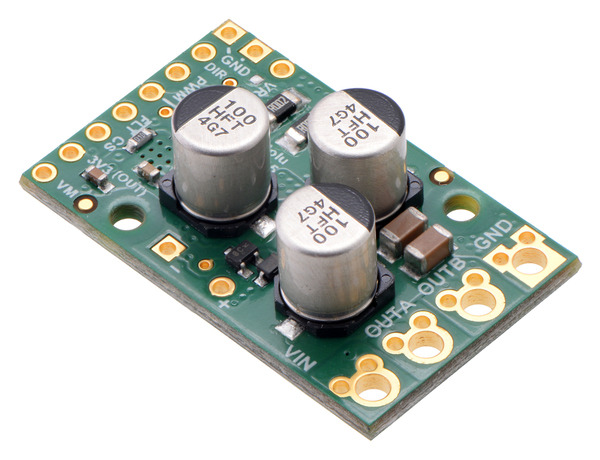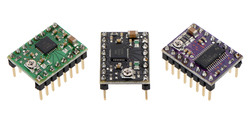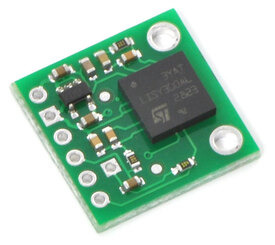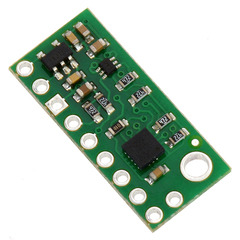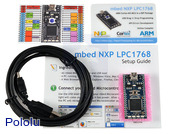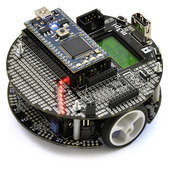Pololu Blog » Posts tagged “pricing” »
Posts tagged “pricing” (Page 2)
You are currently viewing a selection of posts from the Pololu Blog. You can also view all the posts.
Popular tags: community projects new products raspberry pi arduino more…
Rolling out free shipping at Pololu
 |
Everyone wants free shipping, right? Well, today I am happy to announce an important step in bringing free shipping to Pololu, at least for our US customers. We are beginning to offer free shipping in these two senses:
Free shipping within the United States
 |
Some items are eligible for free shipping within the United States. If your shopping cart consists only of items eligible for free shipping, you will be presented with a “Free Shipping” shipping option during checkout. Free shipping will be shipped by a carrier and service we select, which will typically be the lowest-cost, slowest service. Currently, that would likely be First-Class Mail through the US Post Office or a ground service by FedEx, depending on the contents of the order.
Free add-on shipping within the United States
 |
Some items are eligible for free add-on shipping for orders within the United States. These are typically very light items that should not significantly impact our shipping cost, and we pass on those savings to you. No additional shipping will be charged for these items, independent of your shipping method. Orders that consist only of free add-on shipping items will cost the minimum shipping cost for each service as the item sizes and weights will not be added to the shipping cost calculation. Orders with at least one free shipping item and the rest free add-on shipping items will have a free shipping option.
Because items with free add-on shipping will not be considered in the calculation, it is possible for the shipping method you select to be invalid because the package exceeds the limit for that method. In such cases, we will substitute a similar shipping method. For example, if you pay for First-Class Mail as your shipping method but your order actually ends up weighing more than the limit for First Class Mail, we would ship by Priority Mail.
By controlling these two aspects of free shipping on an individual product level, we can really offer free shipping, without raising prices. We are rolling this feature out with a few items we would like to promote:
Products initially eligible for free shipping and free add-on shipping:
|
Pololu Dual VNH5019 Motor Driver Shield for Arduino |
|
|
Tic T825 USB Multi-Interface Stepper Motor Controller (Connectors Soldered) |
|
|
Tic T825 USB Multi-Interface Stepper Motor Controller |
Products initially eligible for free shipping only:
|
Zumo 32U4 Robot (Assembled with 50:1 HP Motors)Zumo 32U4 Robot (Assembled with 75:1 HP Motors)Zumo 32U4 Robot (Assembled with 100:1 HP Motors) |
Products initially eligible for free add-on shipping only:
As we work on our system and monitor the results with these initial products, my goal is to make free shipping, or at least incrementally free shipping, available for more and more of our products. We still do not have a solution for those of you who write us angry emails about the ridiculousness of our charging $3.95 to ship a $2 part (and yes, I am aware of 39-cent listings with free shipping on AliExpress; for now, we cannot compete with them on price alone). But rest assured that since shipping is one of our biggest expenses, we will continue to work hard on keeping that cost as low as we can.
If you see a product that you feel should qualify for free shipping or free add-on shipping but does not, please contact us, and we can evaluate the product’s eligibility. I would also like to hear what you think of this approach and whether you expect it will be helpful to you.
Update (31 October 2017): We are now offering lots more free shipping.
New products: G2 High-Power Motor Driver 18v25 and 24v21 (and price drops for other G2 drivers)
Our second-generation family of high-power motor drivers continues to grow with the release of our G2 High-Power Motor Driver 18v25 and G2 High-Power Motor Driver 24v21, discrete MOSFET H-bridges that can supply a brushed DC motor with up to 25 A of continuous current at up to 30 V or up to 21 A of current at up to 40 V, respectively. In addition, we’ve lowered the prices of the 18v17 and 24v13 versions to make them even more affordable.
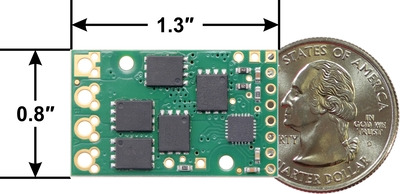 |
The new G2 18v25 and G2 24v21 drivers’ double-sided design allows them to retain the same board dimensions as their 18v17 and 24v13 siblings, even though they can deliver significantly more power. The G2 drivers are half an inch shorter and can handle the same (or slightly more) current compared to the original 18v25 and 24v20 they are designed to replace, and they are less than half the size of the original 18v25 CS and 24v23 CS while offering basic current sensing functionality that can eliminate the need for a dedicated current sensor in some applications. As with previous G2 drivers, they also include reverse-voltage protection and a current limiting feature.
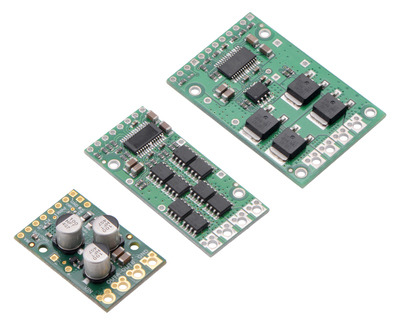 |
Pololu G2 High-Power Motor Driver 24v21 next to original high-power motor driver 24v20 and 24v23 CS. |
|---|
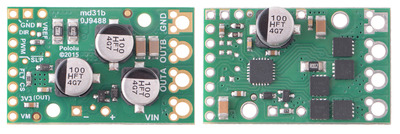 |
Pololu G2 High-Power Motor Driver 24v21 and 24v13. |
|---|
For more information about the G2 motor drivers, see their product pages at the links below.
Big price reductions and new options for our popular stepper motor drivers
We recently substantially reduced prices on our stepper motor driver carriers, and I figured this announcement was a good time to give you an update on our perspective and capabilities.
It has been over five years since I designed our original stepper motor driver carrier, which was for the A4983 from Allegro. While fairly straightforward, the implementation reflected several design philosophies that go into Pololu products, such as making the boards as small as practical and including the right extra components to make the main chip easily usable without unnecessarily limiting its features. Continued…
Big price reduction of Pololu MEMS sensor carriers and IMUs
We have some very exciting price reduction news to share with you, but first:
A little background
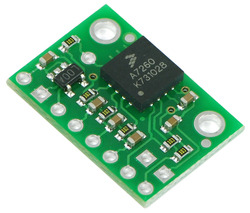 |
3-axis accelerometer carrier, released 22 Apr 2008. |
|---|
MEMS (Micro-Electro-Mechanical Systems) devices are everywhere today, from airbag crash sensors to smartphones to inkjet printer heads, so it is easy to take this ubiquitous technology for granted without considering just how impressive it really is. The defining characteristic of a MEMS device is the presence of microscopic mechanical elements that are similar in size to the features of the electronics in an integrated circuit – if you look closely enough at the silicon of a MEMS inertial sensor, you will see tiny moving cantilevers or springs right alongside the electrical elements that let you interface with them.
Several of us here at Pololu fondly remember using our first MEMS sensors around the turn of the century (the “Y2K” one, not the horse-and-buggy one) as they became affordable enough to consider for our college engineering projects. At the time, it was around $20 for a single-axis accelerometer, and that seemed like a pretty sweet deal! Since then, widespread use of MEMS technology in mobile devices has led to rapidly improving performance and falling prices, putting some amazing technology well within the financial reach of students and hobbyists. However, these same market pressures favor compact, surface-mount ICs that can be integrated into ever-shrinking consumer products, making them very difficult to work with, and this is where we come in: our goal is to make these great sensors available to a much wider audience. We design and manufacture breadboard-compatible carrier boards for these MEMS ICs that include all of the additional required components along with voltage regulators and level-shifters that allow direct integration into 5V systems.
|
|
One side effect of this rapidly evolving technology is that if we want our MEMS products to remain relevant, we have to update them more quickly than our other products. For instance, our 3pi is approaching six years old, yet it is still a decent basic robot platform (see my stock 3pi dominate our recent LVBots maze-solving competition). In that same time, we have gone from our first MEMS carriers – a 3-axis accelerometer for $20 and a single-axis gyroscope for $30 – to a complete IMU with 3-axis accelerometer, 3-axis magnetometer, 3-axis gyro, and pressure sensor, each with performance much better than those earlier units.
So far, we have generally kept our prices the same or had modest decreases as we have released newer units with higher performance, but today we are announcing significant price cuts to our latest-generation boards:
 |
The LSM303D 3D compass and accelerometer carrier is now $9.95, down from $14.95. This inertial sensor consists of a 3-axis accelerometer and a 3-axis magnetometer in a single package.
 |
The L3GD20H 3-axis gyro carrier is now $12.95, down from $19.95. This inertial sensor measures the angular rates of rotation about the roll, pitch, and yaw axes.
 |
The MinIMU-9 v3 is now $19.95, down from $39.95. This IMU module features an LSM303D 3D accelerometer+magnetometer and L3GD20H 3D gyro, providing nine independent rotation, acceleration, and magnetic measurements that can be used to calculate the module’s absolute orientation.
 |
The AltIMU-10 v3 is now $27.95, down from $49.95. This IMU module is equivalent to a MinIMU-9 v3 with an integrated LPS331AP pressure sensor, providing ten independent pressure, rotation, acceleration, and magnetic measurements that can be used to calculate the module’s altitude and absolute orientation.
This fast technology progression makes planning challenging – it sometimes takes six months or more from the time we order a newly-announced component to when it arrives, and by the time we get it and build a board around it, the next great part is announced. This leads to a somewhat complicated lineage of products in various life-cycle stages. The following diagram shows the progression of our products based on ST’s MEMS sensors, which we have been most excited about lately thanks to their digital interfaces and many user-configurable settings:
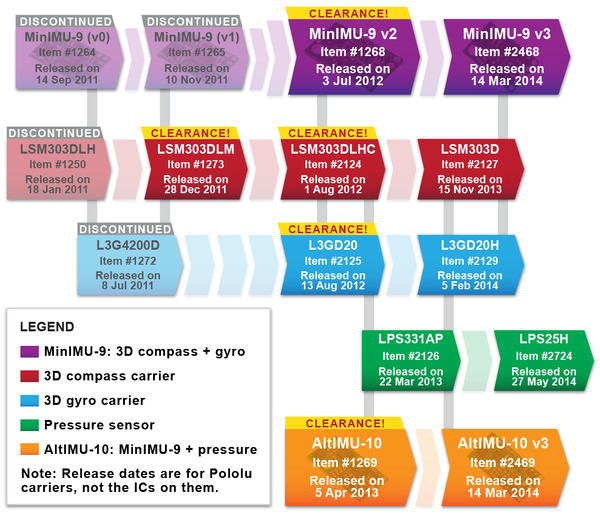 |
Evolution and release dates of Pololu carriers for ST’s MEMS sensors through May 2014. |
|---|
The constant product refreshing also leaves us with older-generation boards that we generally put on clearance. We have decreased the clearance prices of these products so they remain compelling lower-price alternatives to the latest-generation boards. These boards are not recommended for new designs where continued availability is important, but if you just want to play around with a cheap sensor that was state-of-the-art a few years ago, these are a great deal while they last:
 |
The LSM303DLM 3D compass and accelerometer carrier has a new clearance price of $5.95.
 |
The LSM303DLHC 3D compass and accelerometer carrier has a new clearance price of $7.95.
 |
The L3GD20 3-axis gyro carrier has a new clearance price of $9.95.
 |
The MinIMU-9 v2 has a new clearance price of $14.95. This IMU module features an LSM303DLHC 3D accelerometer+magnetometer and L3GD20 3D gyro.
 |
The AltIMU-10 has a new clearance price of $22.95. This IMU module is equivalent to a MinIMU-9 v2 with an integrated LPS331AP pressure sensor.
New product: Adafruit Pi Case
We are expanding our selection of products from Adafruit, and the latest addition is the Adafruit Pi Case, a stylish protective enclosure for the Raspberry Pi. And to celebrate, we are dropping the price of our Raspberry Pis!
LED strips: easy to use and now more affordable
We are giving you one more reason to take your holiday decorations this year to the next level: we have lowered the prices on our LED strips!
 |
Our 30-LED, 1 m strip has dropped from $34.95 to $24.95.
 |
Our 60-LED, 2 m strip has dropped from $69.95 to $47.95.
 |
Our 150-LED, 5 m strip has dropped from $149.95 to $119.95.
And if you are thinking custom lighting seems a little complicated, you will be surprised how easy it is to get these strips up and running with an Arduino. I show you how in this video where I am using the examples included in our Arduino library for addressable RGB LED strips to get started.
QTR reflectance sensors just got more affordable
I am happy to announce another price drop. This time, it’s for several of our QTR reflectance sensors!
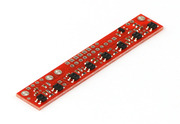 |
QTR-8A and QTR-8RC reflectance sensor arrays are now $9.95 (down from $14.95) with quantity price breaks starting at just five units. These modules feature eight IR LED/phototransistor pairs spaced 0.375″ apart, and an integrated MOSFET allows the LEDs to be turned off for additional sensing or power-savings options. These boards can optionally be broken apart into a six-sensor array and a two-sensor array.
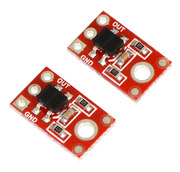 |
QTR-1A and QTR-1RC sensors are now available in packs of two for $4.25 (and for even bigger savings, we’ve dropped the individually packaged QTR-1s from $2.49 to a clearance price of $1.95).
More about QTR sensors
These sensors and the rest of the modules in the QTR family combine infrared LED emitters with phototransistors that detect the amount of reflected IR. This makes them great for applications like edge detection and line following. Each type of QTR sensor is available in two versions: “A” units indicate the reflectance with an analog voltage, and “RC” units have digital I/O-compatible outputs that let you measure the reflectance by timing the discharge of a capacitor.
And don’t forget the newer members of our QTR family, which were priced from the outset in line with our efforts to offer better quality products at lower prices:
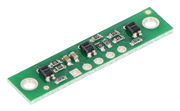 |
QTR-3A and QTR-3RC reflectance sensor arrays make a great minimal sensing solution for a line-following robot. They use smaller sensing elements than the QTR-1 and QTR-8 versions, so they can fit three IR LED/phototransistor pairs onto a compact 1.25″ × 0.3″ board.
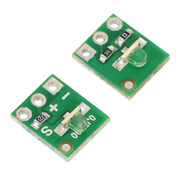 |
QTR-L-1A and QTR-L-1RC sensors use a discrete right-angle infrared LED and a right-angle phototransistor, each mounted on a different side of the board. This results in a very small sensor that has a low profile along the plane of detection.
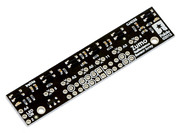 |
The Zumo reflectance sensor array incorporates six IR LED/phototransistor pairs onto a 2.6″ × 0.6″ board, with the distance between the sensors increasing as they get farther from the center of the array. This module was designed to work directly with the Zumo shield on our Zumo robot, but it can also be used as a general-purpose QTR sensor array.
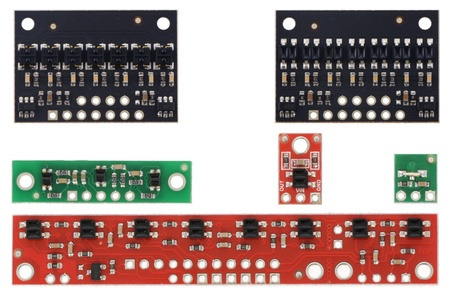 |
QTR sensor size comparison. Top row: QTRX-HD-07, QTR-HD-07; middle row: QTR-3, QTR-1, QTR-L-1; bottom row: QTR-8. |
|---|
ARM mbed NXP LPC1768 price reduced by $10
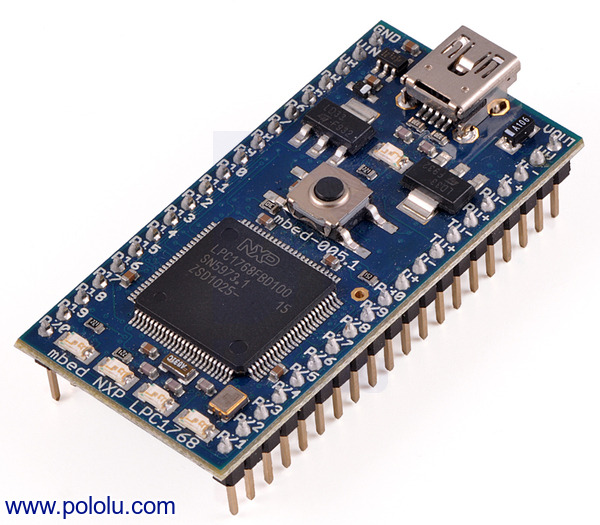 |
You can now buy the ARM mbed NXP LPC1768 Development Board for just $49, a reduction of $10. We also lowered the price of the m3pi Robot + mbed NXP LPC1768 Development Board Combo by $10, to $189.95.
From the product page:
The mbed NXP LPC1768 is an easy-to-use MCU development board designed for rapid prototyping. At its heart is a powerful 32-bit ARM Cortex-M3 processor running at 96 MHz with 512 KB flash and 32 KB RAM, which makes it far more capable than popular 8-bit prototyping alternatives. A comprehensive firmware library and plenty of sample code help you get your program up and running quickly, and a free online IDE and C++ compiler means that no software installation is required. Downloading programs is as simple as using a USB flash drive (no external programmer is necessary).
|
|
Dual motor drivers for less than $5
As part of our continuing efforts to make better quality products at lower prices, we have dropped the prices on some of our smallest dual motor driver carriers and made the first quantity price breaks at just five units for an even better deal! We hope this will make them more compelling alternatives to old motor drivers like the L293D or SN754410.
 |
Our DRV8835 carrier has dropped from $5.95 to $4.49.
 |
Our DRV8833 carrier has dropped from $6.95 to $4.95.
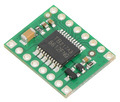 |
And finally, our TB6612FNG carrier has dropped from $8.45 to $4.95. This especially steep price reduction is made possible in part by upgrading the TB6612FNG carrier to use a new reverse protection circuit and all ceramic capacitors (which also allow for a lower profile). The new version of the board is pictured to the left, but we are still transitioning from the old version, so you might receive either one until we complete the transition. For pictures of the original board and details on the status of the transition, please visit the product page.
Ball casters
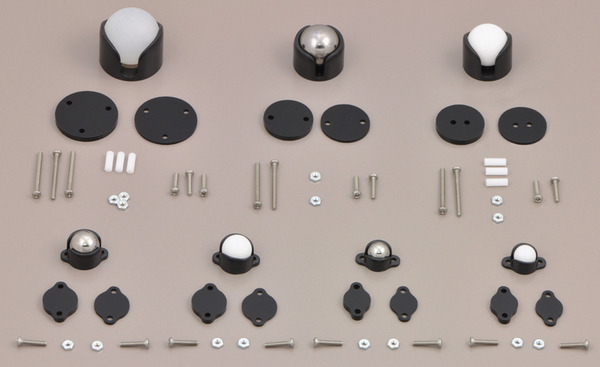 |
We’ve lowered the prices on all of our ball casters! Prices have dropped by $1 to $2 across the whole Pololu ball caster line and start as low as $1.99.








